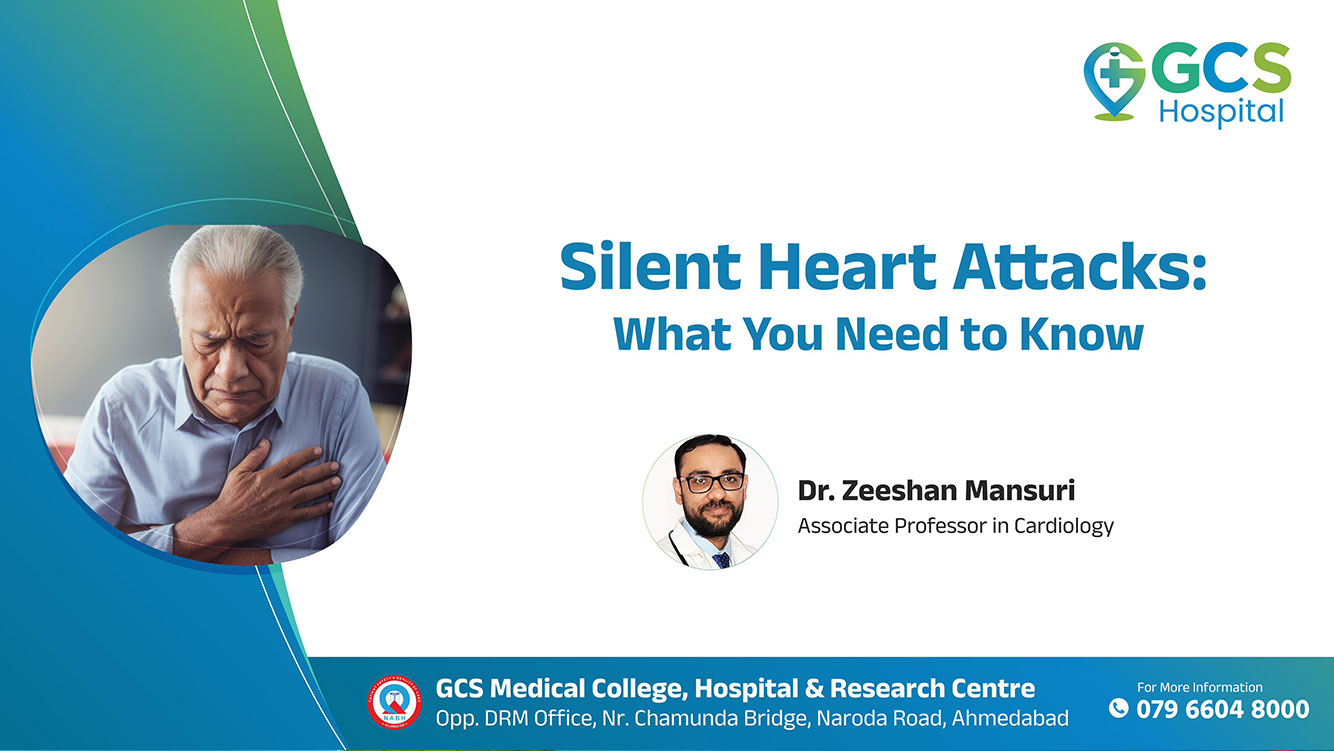
Silent Heart Attacks: What You Need to Know | GCS Hospital
by : Dr. Zeeshan Mansuri, Associate Professor in Cardiology17 January 2025
A heart attack is a serious health event that often comes with unmistakable symptoms like chest pain and shortness of breath. However, there’s a type of heart attack that can occur without obvious signs: the silent heart attack.
What is a Silent Heart Attack?
A silent heart attack (myocardial infarction) occurs when the heart doesn’t get enough blood and oxygen, causing damage to the heart muscle, but without the typical symptoms like chest pain. Instead, individuals may experience mild or unnoticed symptoms, and in some cases, there may be no symptoms at all. Silent heart attacks can still be just as damaging as the more commonly recognized heart attacks.
How Common Are Silent Heart Attacks?
Research suggests that up to 20% of heart attacks may be silent. This condition is particularly prevalent in individuals with diabetes. The key to preventing long-term damage is being aware of the less obvious signs and seeking medical help immediately.
Signs of a Silent Heart Attack
Unlike traditional heart attacks that cause severe chest pain, a silent heart attack may present with:
- Unexplained tiredness
- Sore muscles in the chest or upper back
- Indigestion
- Discomfort in the jaw, arms, or upper back
- Flu-like symptoms
- Shortness of Breath
More severe symptoms of a heart attack include chest heaviness, shortness of breath, dizziness, cold sweats, and nausea./p>
Risk Factors
Certain factors increase your risk of experiencing a silent heart attack. These include:
- High blood pressure and cholesterol
- Diabetes
- Smoking and lack of physical activity
- Stress and poor diet
- A family history of heart disease
Diagnosis and Treatment
Silent heart attacks are often diagnosed weeks days or weeks later, sometimes through blood tests, electrocardiograms (ECG), or imaging tests like 2D Echo. Once diagnosed, prompt treatment is essential. At GCS Hospital, our healthcare team uses advanced techniques like coronary angioplasty, stenting, and sometimes surgery to treat blocked arteries and restore blood flow to the heart.
Prevention
While some risk factors, like age or family history, cannot be controlled, lifestyle changes can significantly reduce the chances of a heart attack. Regular exercise, a healthy diet, and avoiding tobacco are key to preventing heart problems. For those at risk, medications like aspirin or statins may be prescribed.
What to Do if You Suspect a Heart Attack
Even if you’re unsure if you’re experiencing a silent heart attack, it’s important to act quickly. Call 108 for immediate ambulance service. At GCS Hospital, we are ready to provide prompt care to prevent further damage and ensure the best recovery outcomes.
Living With and After a Silent Heart Attack
Recovery may involve making lasting lifestyle changes, including taking prescribed medications, regular checkups, and incorporating heart-healthy habits into your daily routine. With proper care, many people can resume their normal activities and lead a full life.
At GCS Hospital, we prioritize your heart health. If you have risk factors for heart disease or are experiencing any unusual symptoms, don’t hesitate to consult with one of our experienced cardiologists. Early detection and treatment can make all the difference.